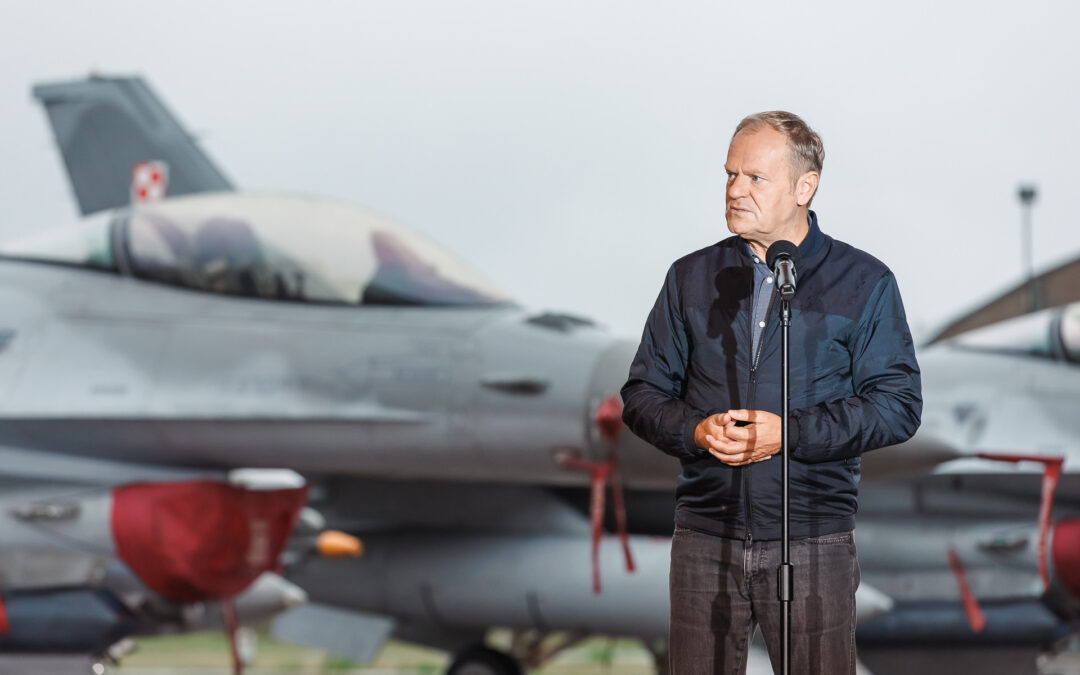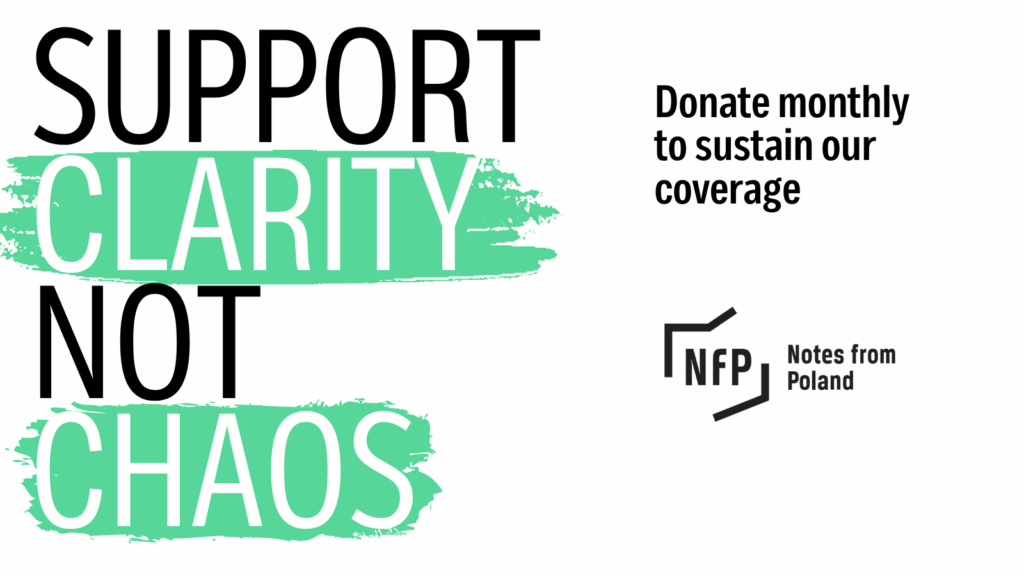Keep our news free from ads and paywalls by making a donation to support our work!

Notes from Poland is run by a small editorial team and is published by an independent, non-profit foundation that is funded through donations from our readers. We cannot do what we do without your support.
By Aleks Szczerbiak
The political fallout from the recent Russian drone incursions into Polish airspace passed over quickly, suggesting that most Poles have normalised the fact that there is an armed conflict on their border. The incident also shows how the right-wing president and opposition’s close political alignment with US President Donald Trump is potentially a double-edged sword.
A pivotal moment?
On the night of 9-10 September, in what the Polish government and its NATO allies condemned as an unprecedented act of aggression, an estimated twenty Russian military drones were recorded repeatedly violating the country’s airspace.
The drones were not fitted with warheads but used as decoys to distract and deplete Ukraine’s air defences ahead of successive waves of Russian missile and armed drone attacks. According to the Polish military, several of them flew in from Belarus, Moscow’s ally where Russian and local troops had been gathering for war game exercises.
In response, in an operation lasting several hours, some of the drones that were felt to represent a direct threat were shot down by Polish and other NATO fighter aircraft. Poland also introduced air-traffic restrictions in the eastern part of the country, including a ban on certain types of civilian flight, and a number of Polish airports were closed temporarily.
Poland has announced that it is triggering NATO's Article 4 in response to last night's violation of its airspace by Russian drones, which were shot down.
"This is a confrontation that Russia has declared against the entire free world," says @donaldtusk https://t.co/h2jhsmvkEN
— Notes from Poland 🇵🇱 (@notesfrompoland) September 10, 2025
Although there were several earlier instances of Russian drones entering Polish airspace, they were never on this scale and none of them deemed threatening enough to merit shooting down.
Indeed, these latest incursions were significantly more dangerous, and created so much anxiety among citizens, because it was the first time the NATO alliance was forced to confront Russian armed forces directly since start of Moscow’s full-scale invasion of Ukraine.
While Russia has often engaged in provocative actions to test NATO’s military capability and political resolve, this was seen as a pivotal moment in terms of muddying the boundaries between hybrid and open hostilities.
As a consequence – in consultation with President Karol Nawrocki, who is also commander-in-chief of the Polish armed forces – the government activated NATO’s Article 4 procedure, which can be used if any member state believes that its territorial integrity, political independence or national security has been threatened.
President @NawrockiKn has approved the deployment in Poland of foreign NATO forces as part of the alliance’s response to this week’s incursion by Russian drones into Polish airspace https://t.co/MMjPKL7fRO
— Notes from Poland 🇵🇱 (@notesfrompoland) September 14, 2025
For its part, Russia maintained that its forces had been attacking Ukraine at the time of the drone incursions and denied intending to hit any targets in Polish territory. Poland flatly rejected this claim, saying that the drones were sent into the country’s airspace intentionally to test Polish and NATO response capabilities.
Either way, because Russia often engages in provocative actions behind a haze of plausible deniability, its intentions are difficult to interpret. So the latest incursions represented a potentially worrying sign that Moscow is more willing to provoke NATO even at the risk of escalating the conflict.
An initial show of unity
The initial reaction to the drone incursion from Poland’s normally bitterly divided political elites was a show of unity.
The coalition government led by Donald Tusk, leader of the liberal-centrist Civic Platform (PO), and Nawrocki – who is supported by the right-wing Law and Justice (PiS), Poland’s ruling party until 2023 and currently the main opposition grouping – are bitter political enemies on most issues and have clashed frequently since the president was elected in June.
However, notwithstanding the fact that closing ranks on this issue was clearly seen to be in the national interest, reacting in an openly partisan way would have been very politically costly while showing a united front was an astute move in line with public expectations.
However, recent years have showed that, even when such displays of unity do occur occasionally, as they did at the beginning of the Covid pandemic or immediately after the outbreak of war in Ukraine, they proved quite short lived and political leaders quickly looked for ways to take advantage of the various crises.
PiS said that the government was trying to use the imperative for national unity to avoid discussion about Poland’s war preparations, arguing that the Tusk administration had failed to invest in anti-drone defences. For its part, the government also accused its PiS predecessor of not developing a proper civil defence system for the country.
Changing the political dynamics?
In fact, by increasing the salience of the security issue, the drone incursions provided the Tusk government with an opportunity to change the dynamics set off by the presidential election result, as a result of which the governing coalition has found itself severely weakened and on the political defensive.
The government lacks the three-fifths parliamentary majority required to overturn a presidential veto, so faces continued resistance from a hostile President able to block its reform agenda and elite replacement programme for the remainder of its term until the next parliamentary election, scheduled for autumn 2027.
Opposition-aligned President @NawrockiKn has vetoed a government bill amending rules on child protection.
Nawrocki has now vetoed as many bills in his first month as predecessor @AndrzejDuda did during his 20 months cohabiting with the current government https://t.co/gKrTv6uiWb
— Notes from Poland 🇵🇱 (@notesfrompoland) August 29, 2025
Just as importantly, Nawrocki’s election victory, and the authority that comes from such a huge personal electoral mandate, has also radically changed Poland’s political dynamics, deeply unsettling the governing parties.
Most Poles feel that the Tusk government has been too passive and lacks any sense of purpose, and many used the presidential election as a de facto referendum to channel their disappointment and discontent with the coalition’s perceived failure to deliver on the policy commitments that helped bring it to power in 2023.
By using a wartime appeal to gain broader public support and avoid having to answer awkward questions about other aspects of its policy agenda, the drone strikes potentially provided the government with an opportunity to buy some time and regroup.
Situations of international insecurity often help to produce what political scientists call a “rally effect”: the inevitable psychological tendency for worried citizens to unite around their political leaders and institutions as the embodiment of national unity when they feel that they face a dramatic external threat.
Moreover, Tusk is highly skilled at taking the initiative and turning these kinds of emergency situations, when citizens feel insecure. into a political opportunity. Even if a lot of this is pure marketing, from a narrow political perspective, Tusk is very adept at communicating a clear message to the public that he is a hard-working prime minister with his finger on the pulse and managing the crisis effectively.
Poland and Ukraine agreed to share experience and expertise in drone warfare, a week after Russian drones violated Polish airspace.
"We want to benefit from your knowledge and skills," Poland's defence minister told his Ukrainian counterpart https://t.co/WjBptry8QO
— Notes from Poland 🇵🇱 (@notesfrompoland) September 18, 2025
After the drone incursions, Tusk once again moved quickly to try and present himself as a war leader, by carrying out visits to military bases and industrial plants, and pledging to push ahead with a great modernisation programme of the country’s armed forces.
The drone incursion also gave the government an opportunity to reprise the pro-EU “security narrative” that it has deployed against the more Eurosceptic opposition parties on a number of occasions, notably in the run-up to the 2024 European Parliament (EP) election.
The incident showed, the government argued, that Poland’s enemies were in the east and not the west, so EU unity, and particularly maintaining good relations with Germany, was imperative. By undermining European unity – and therefore, they claimed, the whole of the continent’s security architecture – PiS and other opposition critics of closer alignment with Berlin and the EU “mainstream” were, they argued, playing into Russia’s hands.
Normalising the war?
While all of this was clearly not, of itself, enough to increase, or even stop the erosion of, support for the ruling coalition, the Tusk government hoped that it might at least buy it some time.
However, the political fallout from the drone incursions passed over very quickly. Even such a significant new development, and the apparently shocking escalation in international tensions, appeared to have had no noticeable positive impact on the government’s standing.
It seems that most Poles have simply normalised the fact that there is an armed conflict on their border so that developments such as the drone incursions do not generate the same sense of acute shock as they did when hostilities first broke out three-and-a-half years ago.
Moreover, the government’s position was severely undermined when it was revealed that, in a speech to the UN Security Council, deputy foreign minister Marcin Bosacki wrongly attributed damage to a residential building in the village of Wyryki-Wola in Eastern Poland to one of the Russian drones when it was in fact inflicted by a missile fired accidentally by a Polish F-16 fighter aircraft.
Forced on to the back foot, the Tusk administration tried (probably counter-productively) to deflect criticism by arguing that Russia bore ultimate responsibility for the incident by orchestrating the provocation, and accused its critics of undermining the Polish armed forces by blaming the pilot who was forced to take preventative measures and shoot down the drones.
Polish media report that the house damaged during Russia's drone incursions was actually hit by a missile from a Polish F-16.
While not confirming those reports, @donaldtusk says, whatever the case, responsibility lies with Russia for sending the drones https://t.co/NUNsWXbkjB
— Notes from Poland 🇵🇱 (@notesfrompoland) September 16, 2025
At the same time, most Poles seem to have a fairly settled, negative view of the current government’s performance. To win, and even survive until, the next parliamentary election, the ruling coalition needs a much more significant game-changer that can shift this current negative dynamic decisively than the apparent escalation of tensions with Russia that the drone incursions represented.
In fact, the Tusk administration does not appear to have either a broader overarching programmatic agenda or a strategic vision and accompanying set of governing priorities that can provide a convincing answer to the question of: what is its purpose and how it intends to implement its plans? Without this, it is difficult to locate even its successes in some kind of attractive and convincing overall narrative.
A double-edged sword?
At the same time, however, the drone incursions also showed how PiS and Nawrocki’s close alignment with US President Donald Trump was potentially a double-edged sword.
One of Nawrocki’s key election campaign pledges was that he was better placed than the Tusk government to capitalise on his apparently close relations with Trump to strengthen Poland’s strategic relationship with the USA.
However critical they may be of the actions of particular American presidents, there is a broad cross-partisan political consensus in Poland that the USA is currently Warsaw’s only credible military security guarantor. Indeed, in an undoubted political success during his first foreign visit as president in September, Nawrocki secured a long-sought-after commitment from Trump that the US would maintain, and possibly even increase, its military presence in Poland.
Donald Trump has suggested the US could move more troops to Poland during a meeting with Polish President @NawrockiKn, who is on his first foreign trip since taking office.
"We’re with Poland all the way and we will help Poland protect itself," said Trump https://t.co/uONZ7I0xPt
— Notes from Poland 🇵🇱 (@notesfrompoland) September 3, 2025
However, Trump’s response to the Russian drone incursions was muted and certainly milder than the condemnations by several European leaders. Initially, his only public comment was a cryptic message on the Truth Social platform saying: ‘What’s with Russia violating Poland’s airspace with drones? Here we go’.
Trump then held talks with Nawrocki, who said that the US president had reaffirmed solidarity with Poland. But his account did not mention any offer of new weapons or equipment and no official transcript of the conversation was released.
Subsequently, Trump suggested that the Russian drone incursions might have been the result of a mistake. His remarks were quickly rejected by the Polish government, Nawrocki, and the main opposition party leaders, as well as Poland’s European NATO allies. all of whom argued that the Russian action was undoubtedly a deliberate provocation.
Trump’s comments, Nawrocki’s critics argued, made the earlier security guarantees that he secured from the US President look much less convincing.
Poland’s government has rejected a claim by Donald Trump that this week’s incursions by Russian drones into Polish airspace "could have been a mistake”.
“We would also wish that the drone attack on Poland was a mistake. But it wasn’t," says PM @donaldtusk https://t.co/06xWUmLoCN
— Notes from Poland 🇵🇱 (@notesfrompoland) September 12, 2025
For sure, in a subsequent rhetorical shift that surprised his NATO allies, Trump suggested that, with European backing, Ukraine was in a position to fight and retake all of its former territory currently occupied by Russia.
Nonetheless, although these remarks prompted relief among some European leaders, others, including Tusk, warned that Trump’s surprising optimism and apparent pro-Ukrainian pivot could actually signal the US scaling back its engagement and shifting responsibility for supporting Ukraine and ending the war onto Europe.
So Nawrocki and PiS still face the risk of being too closely associated with Trump if his apparent repeated pivots on the war in Ukraine are felt by most Poles to be unfavourable to Poland’s security interests.

Notes from Poland is run by a small editorial team and published by an independent, non-profit foundation that is funded through donations from our readers. We cannot do what we do without your support.
Main image credit: KPRM (under CC BY-NC-ND 3.0 PL)





















